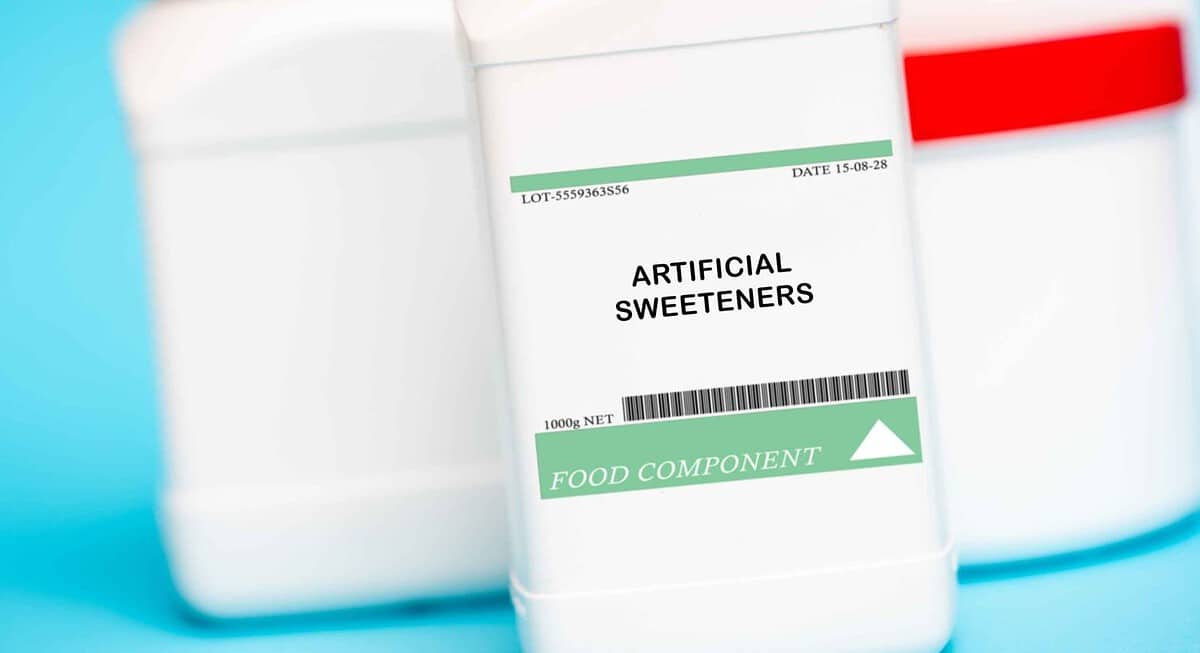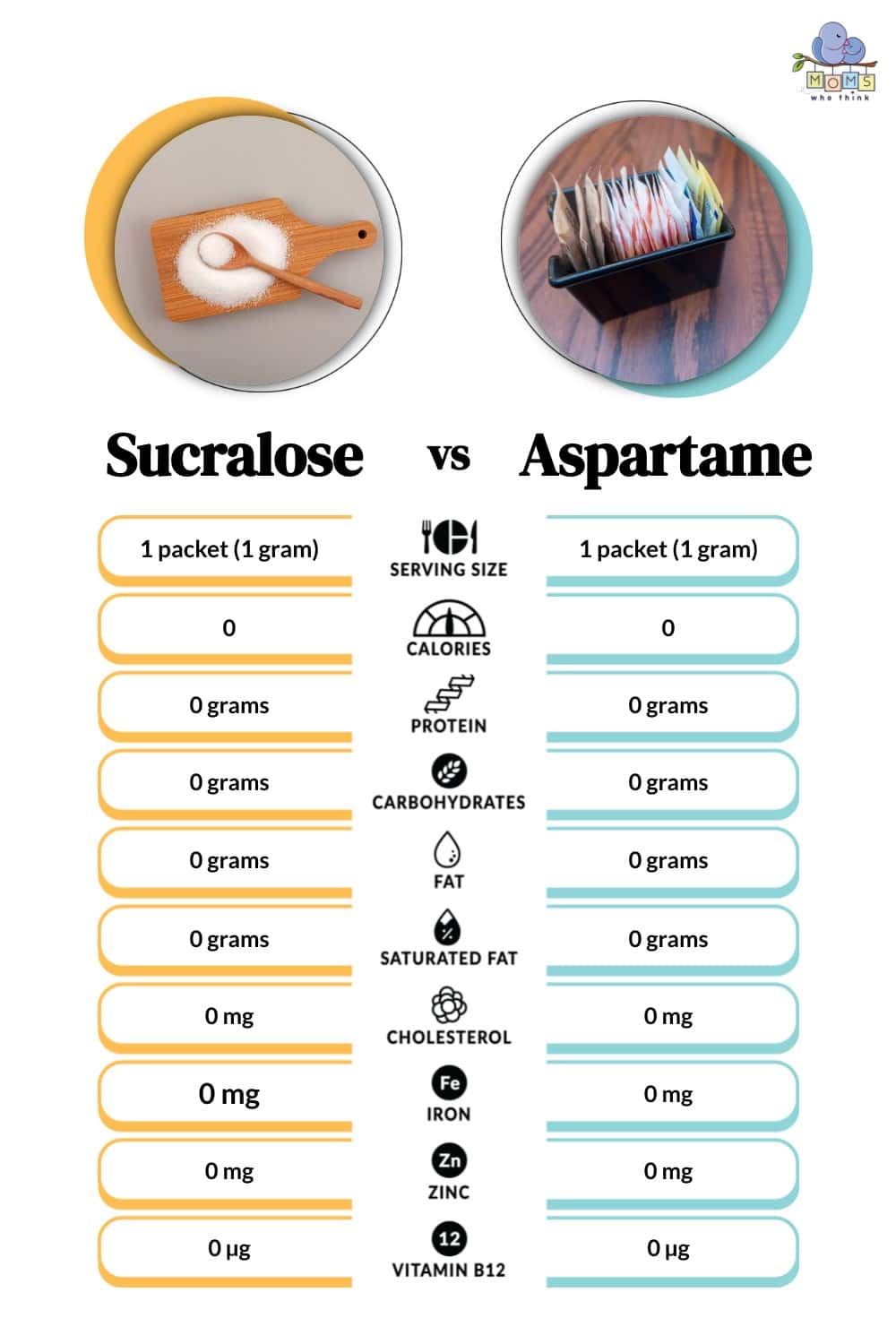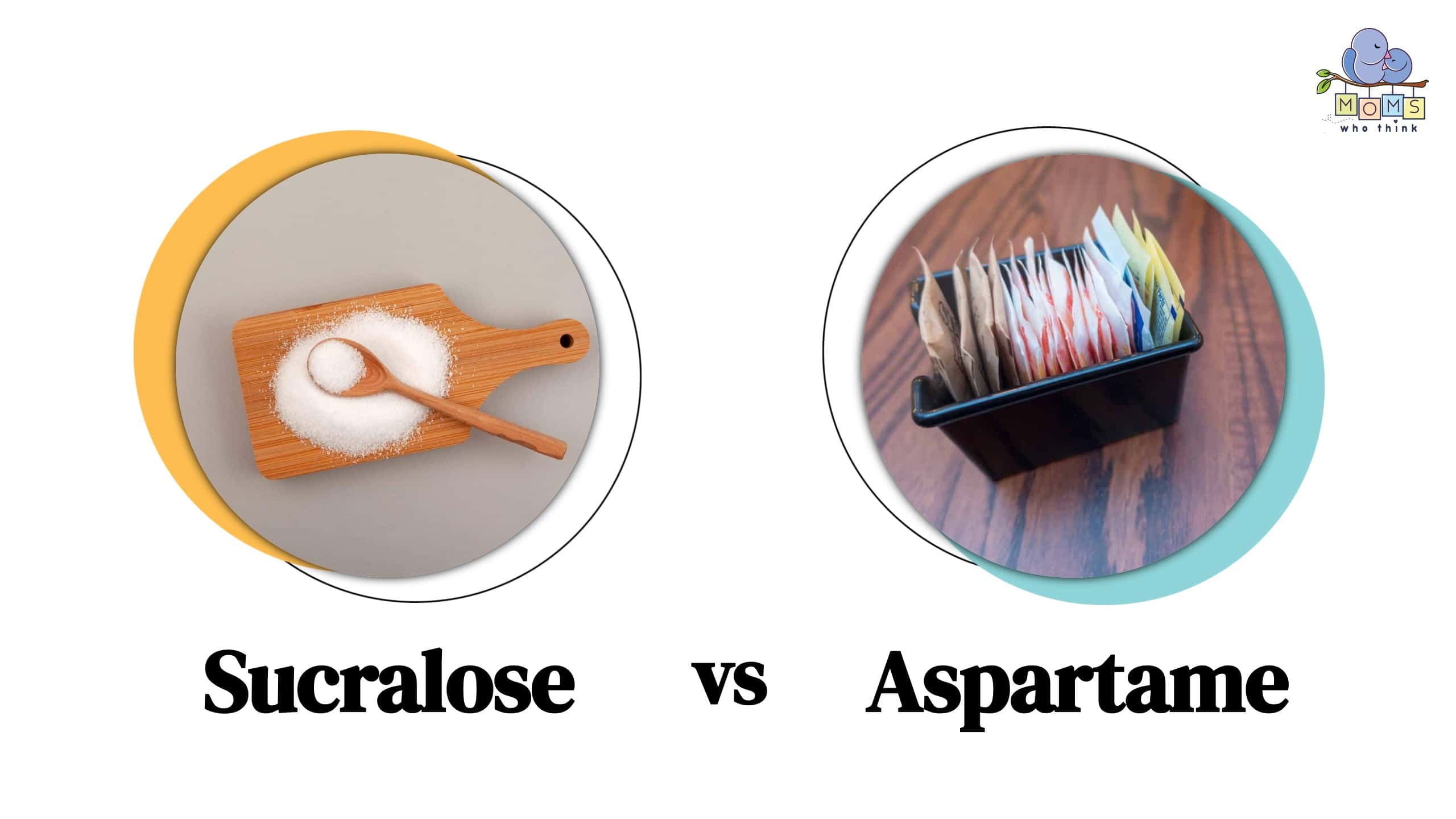One is notably sweeter, and each is considered safe. However, their chemical structure differs, which makes one a better choice for those who have certain health conditions. But which is which? Let’s look into six key differences between sucralose vs. aspartame and discover which option may be healthier for you. Plus, learn which option works best when you’re using high temperatures in the kitchen!
6 Key Differences Between Sucralose vs. Aspartame
| Sucralose | Aspartame | |
|---|---|---|
| Chemical Structure | Derived from sucrose and chlorinated to remove caloric content | Dipeptide made up of aspartic acid and phenylalanine |
| Flavor | 600 times sweeter than natural sugar | 200 times sweeter than natural sugar |
| Heat Stability | Heat stable and appropriate for use in baking and cooking | High temperatures reduce sweetness |
| Uses | Sugar replacement in low-calorie and zero-calorie foods and drinks for those who may be obese and/or diabetic | Sugar replacement in low-calorie foods, drinks, and even toothpaste |
| Metabolic Rate | Does not contain phenylalanine, which makes it appropriate for those who have certain health conditions | Contains phenylalanine and may not be suitable for all |
| Nutritional Value | Zero calories | 4 calories per gram |
Sucralose vs. Aspartame: Chemical Structure
Though both are synthetic, they're not the same. Sucralose is an artificial sweetener that’s derived from sucrose, which is your typical table sugar. Its chemical structure involves the replacement of three hydroxyl groups with chlorine atoms. Sucralose is branded differently but perhaps the one you would most easily recognize is Splenda. This is an FDA-approved synthetic sweetener with a chemical structure that your body can’t break down. Therefore, it doesn’t contain any nutrients because it doesn’t have any calories.

©luchschenF/Shutterstock.com
Aspartame is a dipeptide that’s made up of both aspartic acid and phenylalanine, which are both amino acids. It is also an FDA-approved artificial sweetener that is branded differently but the most common is Equal. This is a chemical structure that your body can break down. Although, it only breaks down parts of it into methanol. Methanol is also produced when you consume other items like fruits. Unlike sucralose, aspartame is considered nutritive because it does have some calories your body is able to process.
Sucralose vs. Aspartame: Flavor
Sucralose is 600 times sweeter than your typical table sugar. This means you need significantly less to create your desired sweetness. Additionally, you can enjoy this potent sweetness without having to endure a bitter aftertaste.
Aspartame is only 200 times sweeter than your typical table sugar. This also means that you need less to create your desired sweetness. But you do need more of it than you would sucralose. Not everybody picks up on the bitter aftertaste of aspartame, but some people find it notable enough that it turns them away from using the synthetic sweetener.
Sucralose vs. Aspartame: Heat Stability
If you desire to cook with one of these artificial sweeteners, your best bet is sucralose. This is a heat-stable synthetic sweetener that you can use while cooking and baking. In fact, you can typically find this sweetener in the baking section at your local grocery store. If you take a magnifying glass to several of the store-packaged items you typically buy, you may notice that sucralose is included in the ingredients list.

©Dasha_Romanova/Shutterstock.com
Aspartame is not a good artificial sweetener to use when you are planning to cook or bake. It’s not as heat stable and when you start using high temperatures, its sweetness starts to dissipate until you’re left without any sweetness at all. You may be able to get away with some dishes or baked goods at lower temperatures but if you are planning to go all out with cooking or baking and want to use an artificial sweetener, sucralose is the way to go.
Sucralose vs. Aspartame: Uses
Since sucralose is more heat stable and has a sweeter taste and aftertaste, it’s typically associated with having a better flavor and is used in several low-calorie foods and drinks. It’s even incorporated into some medications to deliver a bit of sweetness without affecting the caloric value significantly. Some of the products you typically buy may incorporate sucralose like sugarless gum, frozen dairy, ice cream, and even sugar-free soda and candies.
Aspartame has similar uses and is often incorporated into low-calorie foods and drinks. You can typically find aspartame in items like sugar-free ice cream and candies, zero-sugar sodas, and even fruit juice with reduced calories. Even if a store-bought item is not labeled as ‘low-calorie,’ the ingredients may still include an artificial sweetener like aspartame. If you are sweetener-conscious, make sure to double-check the ingredients list of all items you purchase.
Sucralose vs. Aspartame: Metabolic Rate
People who have phenylketonuria (PKU) need to know that between sucralose and aspartame, sucralose is the safer artificial sweetener. This is because your body doesn’t metabolize it and it doesn’t contain the amino acid phenylalanine. PKU is a genetic disorder and according to the FDA, all products must list if a product has aspartame, which informs those reviewing the ingredients that the product contains phenylalanine.
Additionally, the FDA put out a statement regarding aspartame being possibly carcinogenic, noting that its FDA scientists “do not have safety concerns when aspartame is used in the right conditions.”
Sucralose vs. Aspartame: Caloric Content

Sucralose doesn’t have any calories and your body doesn’t metabolize it. Aspartame, on the other hand, has 4 calories per gram. However, this is so minimal that it doesn’t affect the total number of calories in whatever drink or food item it’s used in. Your body doesn’t recognize sucralose as a source of energy, so it leaves your body without having gone through any kind of breakdown process. With aspartame, your body metabolizes it and changes its chemical structure.
Sucralose vs. Aspartame: Can You Substitute One for the Other?
Generally, yes, you can substitute one for the other, which is why you find them used in similar products. However, you have to remember that sucralose is significantly sweeter than aspartame and it’s also more heat stable, which means you can use it for cooking and baking.
So, in the case of working with one of these artificial sweeteners in the kitchen, you want to lean towards sucralose. Both sucralose and aspartame behave differently in different pH levels as well, so you have to consider the alkalinity or the acidity of your beverage choice if you’re choosing to add an artificial sweetener.
Similarly, you have to consider your individual health. For those who have PKU, sucralose is the better option. Aside from these considerations, it ultimately comes down to a matter of taste preference. If you can pick up on the sometimes bitter aftertaste of aspartame, you may want to lean toward sucralose, which keeps its sweetness through and through.
Sucralose vs. Aspartame: Which One is Healthier?
The artificial sweetener that is healthiest for you may not be the healthiest for someone else. Ultimately, the only person who can answer which one is healthier for you is you (along with guidance from your medical provider). However, you can consider the advantages each one has. Sucralose doesn’t have any calories at all, it’s free of phenylalanine, and it has a sweet taste profile without a bitter aftertaste. Aspartame also offers sweetness without the calories of regular table sugar. It’s versatile, so long as you don’t use high temperatures.
